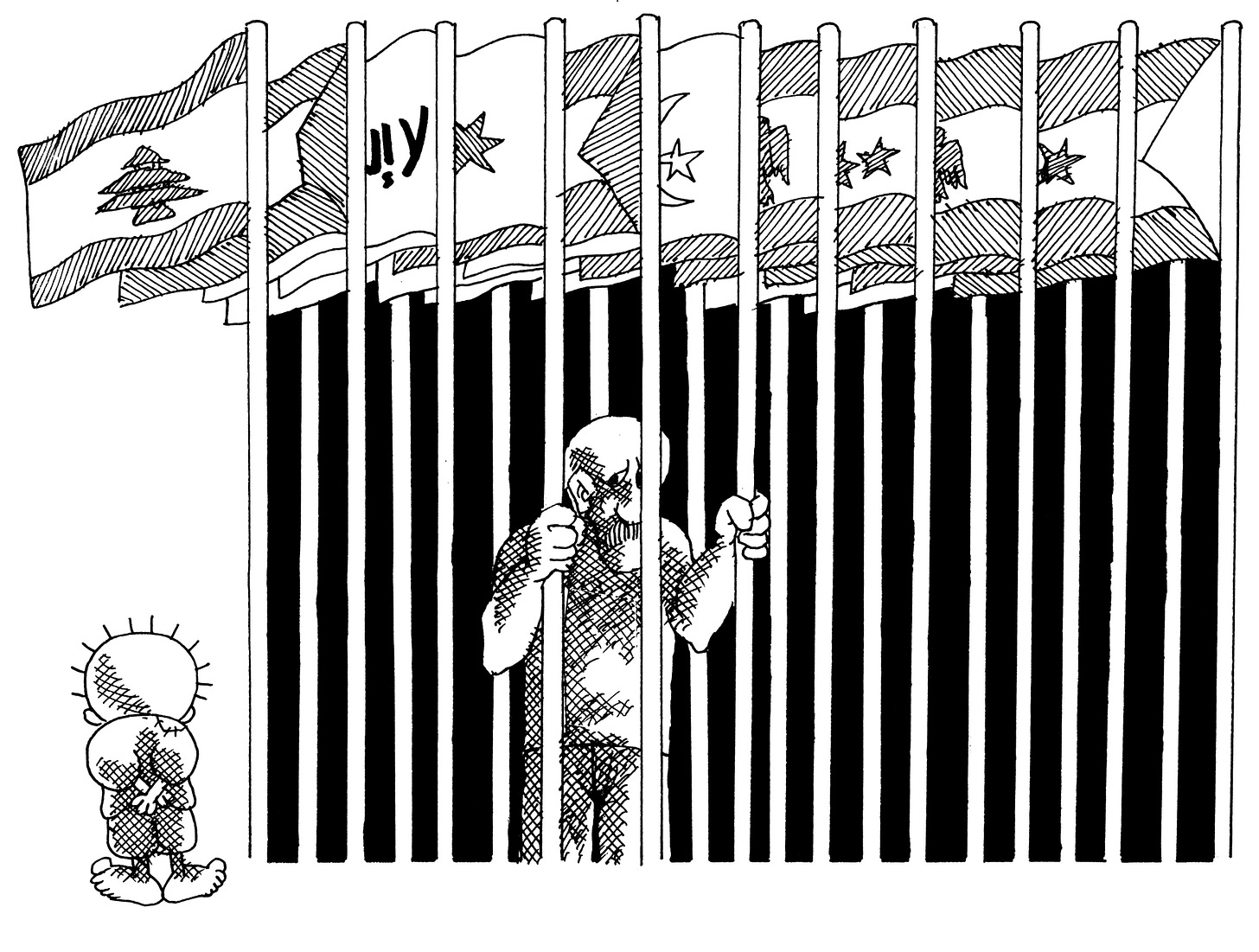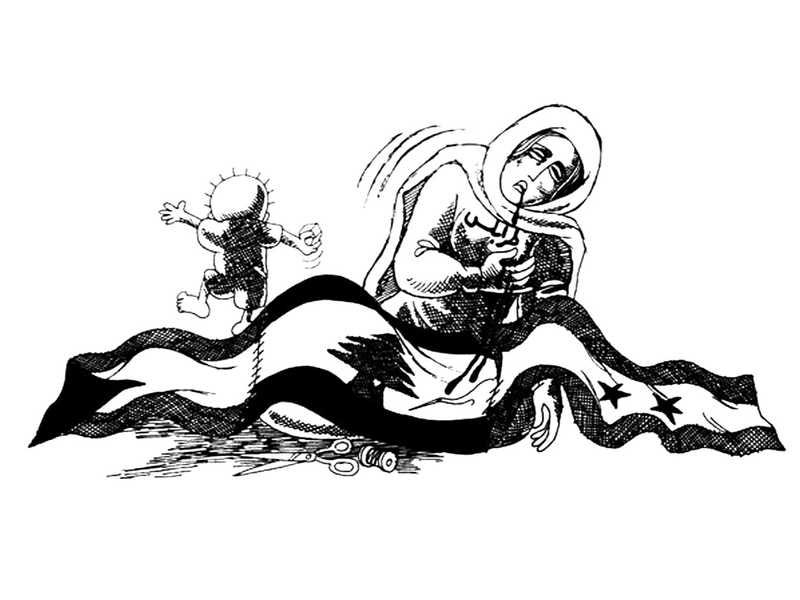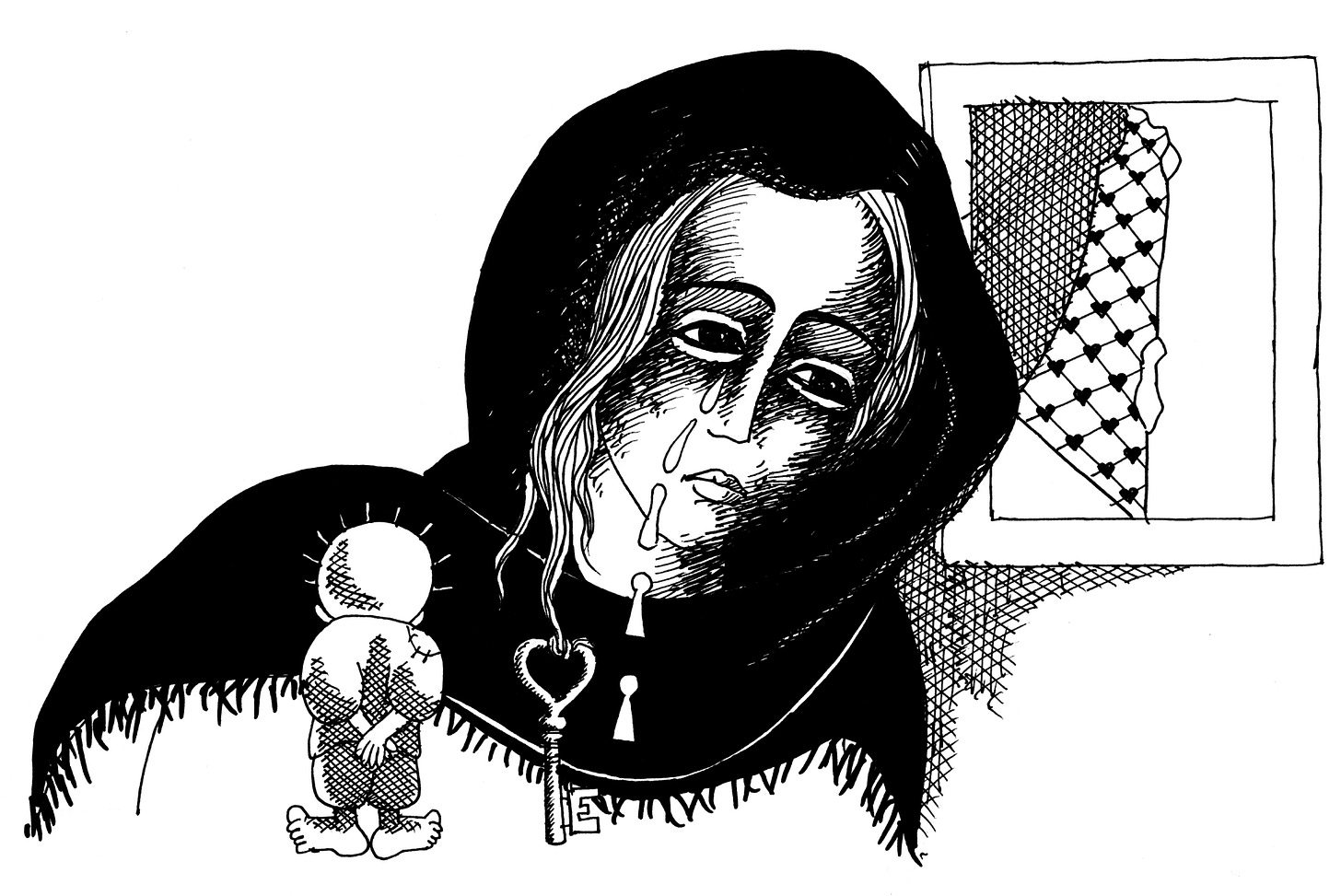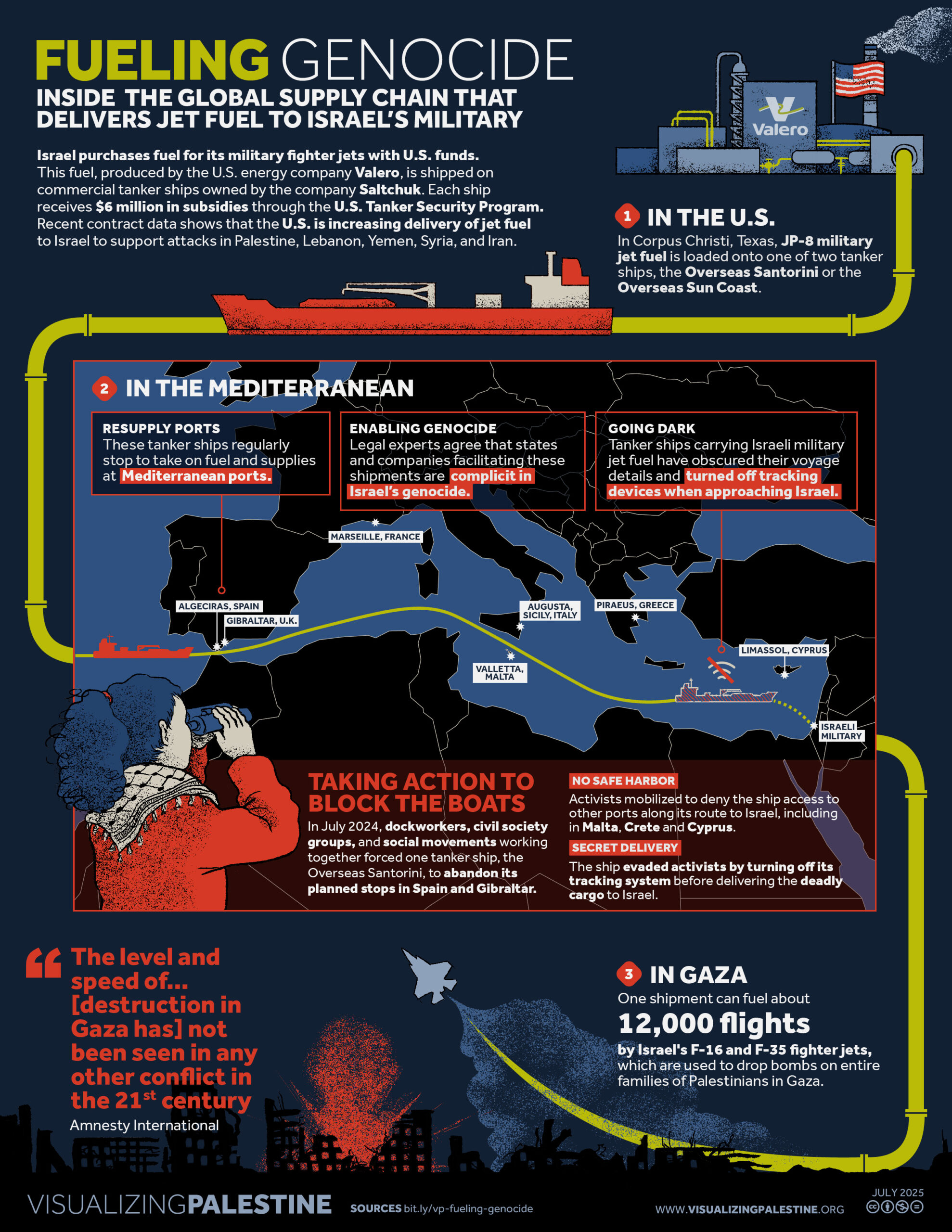Mesopotamia. Babylon. The Tigris and Euphrates. How many children in how many classrooms, over how many centuries, have been hang-glided through the past, transported on the wings of these words?
And now the bombs are falling, incinerating and humiliating that ancient civilisation.
On the steel torsos of their missiles, adolescent American soldiers scrawl colourful messages in childish handwriting: ‘For Saddam from the Fat Boy Posse’. A building goes down. A marketplace. A home. A girl who loves a boy. A child who only ever wanted to play with his older brother’s marbles (Arundhati Roy, 2004, p. 81).
Arundhati Roy’s heartrending lament of course refers to the 2003 invasion and destruction of Iraq by the US and its Coalition of the Willing (the US, the UK, Australia, and Poland – a gang otherwise known as the ‘bullied and the bought’). An invasion and occupation that by some estimates have caused the deaths of up to 2.4 million Iraqis, a figure that does not include more than half a million children who died as a result of 13 years of harsh economic sanctions leading up to the invasion.
But Roy’s words could be applied equally to many other countries that have been subjected to ‘the broad-spectrum antibiotic of [US] “democratic reform”’, and they will be just as relevant to those countries – like Iran – for whom such treatment lies in store.
Since 2003, more or less the same Fat Boy Posse (plus Israel) has been doing pretty much the same things in places like Afghanistan, Lebanon, Libya, Palestine, Somalia, South Sudan, and Syria. Countries that have been cast by the US and its allies (also known as ‘the international community’) as ‘peripheral countries that are either ‘state sponsors of terror’ (never mind that the US is the reigning world champion) and/or countries whose ‘governments are not in control of all of their territory’ and clearly are therefore in need of ‘stabilising’ with US ‘help’.
So where will the Fat Boy Posse and friends strike next?
The notable regional omission from the list of countries that have been ‘stabilised’, ‘democratised’ and saved from themselves by the US et al. is the ancient (ten-thousand-year-old) civilisation of Iran. It is the final and, arguably, the most important remaining target.
A full-blown attack on Iran has been in the making for at least the last half century. It gathered pace with the identification of Iran as a prime target by the US in its pursuit of the Israeli 1996 ‘clean break strategy’ to remake the Middle East.
Now – before Iran becomes too difficult to subdue and disintegrate – there is a sense of urgency in Israel and the US to complete the unfinished business begun with the 12-day war of June 2025. With the support of the West, whose elites have always sought control over the natural resources of the Middle East, Israeli and US bombs and missiles with similar inscriptions to those dropped on Iraq will soon be raining down on Iran.
Except – unlike Iraq, Palestine and the other countries on the list – militarily Iran will be a much more resolute, well-armed and fearsome opponent. In a war with Iran, there will be many missiles flying in the opposite direction. Missiles whose steel torsos will bear inscriptions like, ‘For Donald and Benjamin from the Persian Immortals and Aswaran’.
Drawing on Noam Chomsky and other recent analyses of the issues involved, in this essay, first, we will explain why war with Iran is almost inevitable in the short term. We shall do so by setting out the main factors that – historically – have determined the positions of the opposing sides towards each other and, in the process, expose the specious arguments or pretexts used by Israel and the US to justify their aggression.
Second, we shall discuss briefly the necessary conditions for a just peace in the Middle East and say why we think its prospects are so poor.
Third, we shall argue that the impending war is likely to be more devastating and costly in terms of lives lost than any other war fought in the Middle East, a war that will have significant regional and global ramifications and, according to Jeffrey Sachs, will be unwinnable.
And fourth, on the basis of our discussion, we shall apportion responsibility for the imminent renewal of conflict among the three main combatants – the US, Israel, and Iran.
The Israeli-US Position
The ‘threat’ allegedly posed to US and Western interests and ‘security’ by a recalcitrant Iran has always been a function of its geostrategic importance in the Middle East, which has a number of important dimensions, some quite recently developed, and some of which have global ramifications.
Iran’s Natural Resource Wealth. Iran has the second largest economy in the Middle East, which is dependent on its significant deposits of oil (with an estimated value of $10 trillion) and gas (about 18% of the world total) and, to a lesser extent, substantial reserves of coal, copper, iron ore, lead, and zinc, along with uranium and gold. Overall, in terms of natural resources, Iran claims to be the fifth richest country in the world.
This is the historical bedrock of Western (capitalist) interest in the balkanisation of Iran. US control of the region would give it ‘a degree of leverage over both rivals and allies probably unparalleled in the history of empire… It is difficult to overstate the role of the Gulf in the way the world is currently run’ (Stevenson quoted in Chomsky, 2019)
Needless to say, these qualities will not have gone unnoticed by a ‘property development’- minded US president.
Threat to the disruption of shipping in the Straits of Hormuz. Iran’s long southern sea border with the Persian Gulf enables it to disrupt shipping, particularly in the very narrow Straits of Hormuz. Approximately 20% of global oil consumption and a high percentage of global gas consumption passes through the straits.
Iran’s improving relations with China and Russia. In addition to the above, the importance to the US of regime change in Iran has increased significantly as Iran’s economic and military ties with Russia, China and North Korea have improved.
Examples include the recently opened Belt and Road Initiative (BRI) rail link from China to Tehran via Kazakhstan, Turkmenistan, and Uzbekistan, which has greatly expanded trade between the two countries. Another rail link is planned that would traverse northern Afghanistan, Tajikistan, and Kyrgyzstan, also as a part of the BRI.
China is now Iran’s largest trading partner and imports a significant proportion (some estimates indicate as much as 90%) of Iran’s oil output or about 11 million barrels per day or 15% of China’s oil imports.
Clearly, the harm that regime change in Iran could do to China will be of considerable appeal to the current US administration and its allies.
According to Michael Hudson, another threat to US interests arises from the warming relations between Iran and Russia, which portend the possibility of a Russian route to the Persian Gulf, via the Caspian Sea and Iran, which would enable Russia to bypass the Suez Canal.
A sovereign Iran also gets in the way of the proposed India-Middle East-Europe Economic Corridor (IMEC), announced by the US in 2023 as a counter to the BRI.
Contribution to de-dollarisation. In conjunction with the rapid development of BRICS, the possibility – suggested by Yanis Varoufakis – that China might establish a new Bretton Woods, and the political frailty of some of the family controlled Arab states, these developments threaten to accelerate the de-dollarisation of the world economy. The reliance of world economies on the US dollar underpins US global hegemony.
An impediment to a Greater Israel. The notion of a Greater Israel – one that expands its borders to include Gaza, the West Bank, and parts of Lebanon, Syria, Jordan and even Egypt and Saudi Arabia – is a paramount and long-held Zionist objective and a stated ambition of Netanyahu’s right-wing government.
Iran’s geographical presence, which bestrides the Middle East, and its support of Hezbollah, Hamas, and the Houthis – the so-called Axis of Resistance to US/Israeli dominance of the region – is an impediment to this.
In order for Israel to achieve its Greater Israel aims, regime change in Iran is a necessary and sufficient condition.
Defiance and a threat to ‘world peace’. Like Cuba and Venezuela and other recalcitrants, since the election of Ayatollah Ruhollah Khomeini in the Islamic revolution of 1979, Iran’s mortal sin has been to refuse to do as the US and Israel and the West generally dictate, which is taken and depicted as a threat to the US-imposed global order, otherwise known as ‘world peace’. Chomsky (2013) explains it in the following terms:
We’re back to the Mafia principle. In 1979, Iranians carried out an illegitimate act: They overthrew a tyrant that the United States had imposed and supported, and moved on an independent path, not following U.S. orders.
And, most dangerous of all, ‘Successful defiance can inspire others to pursue the same course. The “virus” can “spread contagion,” as Kissinger put it when labouring to overthrow Salvador Allende in Chile’ (Chomsky, 2019). Without absolute fealty to the Godfather, the whole system of domination will crumble. Miscreants must therefore be taught to behave.
Moreover, the significance of disobedience to the US rises exponentially when it is tied to the possibility of nuclear deterrence, as Chomsky (2019) avers: ‘For those who wish to rampage freely in the region, a deterrent is an intolerable threat — even worse than “successful defiance”.’
The threat of nuclear weapons. Israel has long held that Iran intends to develop nuclear weapons, which would clearly constitute a violation of the Nuclear Non-Proliferation Treaty (NPT). This assertion (unsullied by evidence to support it) has been at the centre of Israel’s long-standing pretext for its aggressiveness towards Iran, justified on the basis of self-defence and presented as the West’s first line of resistance against the threat that a nuclear armed Iran would pose to the rest of the world.
The latter view was expressed explicitly by Israel’s Ambassador to the UN, Danny Danon, on 20 June 2025 before the UN Security Council when he said that Israel was doing the “dirty work… for all of us”, and was protecting “civilisation” from “jihadist [Iranian] genocidal imperialism”, which wants to redesign the global order.
No matter that, with US backing, Israel, Pakistan, and India all posses nuclear weapons and are not signatories to the NPT.
Historical antagonism towards Iran. The last seventy-five years of enmity between Iran and the US and its allies began with the coup instigated by the UK with US support in 1953, which reinstalled Pahlavi as Shah. According to Chomsky (2013), since that time, ‘not a day has passed in which the US has not been torturing Iranians.’
Its continuation to the present day has been marked by ‘cyberwar and sabotage …, numerous assassinations of Iranian scientists, constant threats of use of force (“all options are open”) in violation of international law (and if anyone were to care, the U.S. Constitution) (Chomsky, 2022)’, as the following critical incidents demonstrate:
- First, the Islamic revolution of 1979, which overthrew the despotic US puppet regime of the Shah.
- Second, the severance of diplomatic relations by the US in 1980 after Iranian students – who were protesting the admission to the US of the Shah for cancer treatment – broke into the US embassy and held 52 US citizens hostage for 444 days. Economic sanctions were also imposed on Iran.
- Third, the provision by the US of support to Saddam Hussein in the Iraq-Iran war, which began in September 1980 and lasted for 8 years and resulted in the deaths of up to 750,000 Iranian military personnel and civilians, many of them killed by chemical weapons.
- Fourth, the designation of Iran as a ‘state sponsor of terror’ by President Ronald Reagan in 1984. This followed an attack on a US military base in Beirut that killed 241 US military personnel. The attack was attributed to Hezbollah, a Lebanese Shia organisation backed by Iran.
- Fifth, in July 1988, the shooting down of Iran Air flight IR655 by a US warship in the Persian Gulf, which resulted in the deaths of all 290 passengers and crew. Although it paid compensation to the families of those killed, the US never admitted responsibility or apologised. After the tragedy, the arrogance of the US and its disdain of Iran were typified by President George Bush’s infamous exclamation ‘I’ll never apologize for the United States of America. Ever. I don’t care what the facts are.’
- Sixth, in 1995, the imposition of more sanctions on Iran by President Bill Clinton – which persist to this day – and have caused enormous suffering in Iran. At about the same time, in order to foment insurrection and bring about regime change, the US dramatically increased its funding of exiled Iranian monarchists and opposition groups within the country.
- Seventh, in 2002, in the aftermath of 9/11, the designation of Iran as a member of the ‘Axis of Evil’ (with Iraq and North Korea) by President George Bush.
- Eighth, in 2018, President Trump’s withdrawal of the US from the Joint Comprehensive Plan of Action (JCPOA), which was designed to limit Iran’s nuclear activities (including a cap of 3.67% on nuclear enrichment) in exchange for an easing of sanctions.
- Ninth, in Baghdad in 2020, in a drone strike, the assassination by the US of Iranian General Qassem Soleimani, the head of the Quds Force of Iran’s Islamic Revolutionary Guard Corps (IRGC).
- Tenth, in March 2025, the initiation by the US of fake negotiations for a new nuclear deal as cover for an attack on Iran by Israel and the US on 13 June 2025, which marked the beginning of the 12-day war.
US/Israeli Orientalism and Islamophobia. Orientalists believe in the intrinsic superiority of the peoples of the West (Europe, the US and the Anglo settler societies) and Western civilisation over the peoples and civilisations of the Orient (the Middle East, North Africa, and South and Southeast Asia) or the “other.”
As we have noted elsewhere:
‘The brutal and, all too frequently, genocidal consequences of Orientalism have a gory track record that is well known, but its manifestations today are more flagrant, more brazen, and more recorded than ever. The Western-perpetrated or sponsored atrocities of the 21st century, many of which are US- and Israeli-made, all bear its hallmarks.
Carried to the extreme, Orientalism casts the “other” as sub-human, or vermin that are treated with revulsion and can be exterminated or deracinated without compunction, as was the practice in the colonies, in apartheid South Africa, in settler societies such as the US, Canada, and Australia, and as is happening now in Palestine. It amounts to institutionalised racism of the most pernicious kind that is both latent and manifest.’
It is certain that a new war with Iran will be fuelled partly by the Orientalism and Islamophobia that are deeply ingrained in the governments of both the US and Israel, and which will include beliefs about the general inferiority and unworthiness of the ‘raghead’ opposition, their corruption and cowardliness, and US and Israeli superiority, exceptionalism and divine right.
In this view, Muslim deaths can be discounted because they are terrorists and religious fanatics or because, if they are not, they carry the seeds of terrorism and religious fanaticism within them and are therefore richly deserving of their fates.
The vitriolic responses of right-wing extremists in the US to the assassination of Charlie Kirk in September 2025 – such as Steve Bannon who said ‘Charlie Kirk is a casualty of war. We are at war in this country’ and Eon Musk: ‘If they won’t leave us in peace, then our choice is to fight or die’ – are representative of the views of a president and government who they helped elect.
According to Chris Hedges, ‘Kirk was a poster child for our [US] emergent Christian Fascism’. And, like all fascists, Kirk was Islamophobic, tweeting ‘Islam is the sword the left is using to slit the throat of America,’ and that it is ‘not compatible with western civilization.’
Presidential idiosyncrasies. Our recent parody of President Trump’s international ‘property development’ ambitions notwithstanding, it is necessary to qualify any attempt to apply the constraints of rational argument to US foreign policy by saying that the president’s psychological condition makes the ideas of ‘logic’ and ‘rationality’ anathema.
We are not alone in thinking this. Commenting on Trump’s first term in office, Chomsky (2019) observed: “It is a mistake to seek some grand geopolitical thinking behind Trump’s performances. These are readily explained as the actions of a narcissistic megalomaniac whose doctrine is to maintain personal power, and who has the political savvy to satisfy his constituencies, primarily corporate power and private wealth but also the voting base.” Most would agree that the bizarreness and unpredictability of his behaviour have discovered new heights in his second term in office.
Sachs (2020) also regards Trump as being ‘emotionally unbalanced’ and ‘psychologically disordered’.
Even though in the cases of Iran and Palestine, the presidents’ whims are subject to gale-force headwinds from the irrepressible and irresistible Israel lobby in the US, and to some extent they will be channelled by Western elites led by his self-appointed pack of oligarchs, it is difficult to imagine any significant US military action against Iran not being subject to his flights of fancy.
In the conclusion to this essay, we shall return to the complex question of presidential caprice and the extent to which it might be influenced by the factors that we discuss below. And we shall consider where the exercise of such caprice is likely to be at its greatest.
Iran’s Position
Historical continuity and resilience. Throughout history, for those with imperial ambitions in the Middle East, Iran/Persia has been a much sought after prize and, for would be conquerors, an implacable and formidable opponent.
These qualities are exemplified in the ancient Iranian battle formation known as the Persian Immortals, which were 10,000 strong and were so named because their number seemed never to be depleted during battle, as dead and wounded were replaced immediately.
The same incandescent bravery was displayed in the war with Iraq where ‘human wave assaults’ were often made by units of young volunteers.
Despite being conquered by the Greeks under Alexander the Great, and others like the Mongols under Genghis Khan, Persian civilisation and cultural identity have shown remarkable strength and durability and have been an important unifying force and source of pride for its people to the present day.
National sovereignty. Since the overthrow of the US puppet regime of the Shah in 1979, quite reasonably, Iran has insisted on being the master of its own affairs, free from the bullying of the Godfather in Washington and his enforcer in the Middle East, Israel.
Regional religious solidarity. Iran’s backing of Hezbollah in Lebanon, Hamas in Palestine, and the Houthis in Yemen can be interpreted as aid to the defence of the sovereignty of fellow (Shia, except Hamas) Muslims against the aggression of a US-supported Israel, that is, a legitimate version of the politically contrived ‘self-defence’ employed by Israel as an excuse for its aggression and endorsed by its Western supporters.
Defensive posture and deterrence. Iran’s position vis-à-vis Israel and the US has been abundantly clear for at least the last 25 years.
Fifteen years ago Chomsky (2011, p. 197) declared that, despite the ‘fevered rhetoric’ about nuclear weapons, ‘rational souls understand that the Iran threat is not one of attack – which would be suicidal.’
Chomsky quotes a senior US intelligence official as estimating (in 2008) that the chances of the Iranian leadership making a nuclear strike (a ‘quixotic attack’) on Israel was in the region of 1%. First, because they realised that this would lead to their own annihilation and Iran’s instant destruction. And second, because the Iranian leadership would be reluctant to sacrifice the ‘vast amounts of money’ and ‘huge economic empires’ they had accumulated (again, the US should know as it is so well-versed in such matters) – now, presumably, even greater than they were then.
The same official acknowledged that Israel’s 1981 attack on Iraq’s nuclear reactor did not end Saddam’s nuclear weapon’s programme, it initiated it.
Clearly, the recent 12-day ‘feeler’ or ‘warm-up’ war was prosecuted by the US and Israel in the full knowledge that, first, if Iran had nuclear weapons (very unlikely), there was only about a 1% chance that they would use them against Israel; and second, if they didn’t, there was good evidence to suggest that an attack by Israel and the US would spur Iran into developing them, as it had done with Iraq.
As we and others have observed elsewhere, in the light of the above, in Iran the balance of opinion in government is now likely to have swung in favour of developing nuclear weapons, as a deterrent.
It would be the rational thing to do. Chomsky (2007) tacitly agrees: ‘It is easy to understand an observation by one of Israel’s leading military historians, Martin van Creveld. After the U.S. invaded Iraq, knowing it to be defenceless, he noted, “Had the Iranians not tried to build nuclear weapons, they would be crazy.”’
In the same paper, Chomsky asks the rhetorical question, ‘how would “we” (the US) have reacted if Iran had invaded Canada and Mexico?’ Of course, since then, the provocations and scope for rhetorical questions of this sort have got much worse.
A Framework for Peace
The framework for peace is the same as it has been since the turn of the century, namely, the creation of a Weapons of Mass Destruction Free Zone in the Middle East (WMDFZME).
For some time, ‘global… support [has been] overwhelming for a WMDFZME; this zone would include Iran, Israel and preferably the other two nuclear powers that have refused to join the Nuclear Non-Proliferation Treaty: India and Pakistan, who, along with Israel, developed their programs with US aid’ (Chomsky, 2012).
Straightforward enough for sane people who want to avoid catastrophe, but even more certain to be spurned now than it was then by the US and Israel for the reasons given above.
The Likely Character of the Impending War
At the beginning of this essay, we referred briefly to just some of the consequences of the invasion of Iraq by the US and its allies, which have included up to 3 million Iraqi deaths.
In my own experience of post-invasion Iraq in 2011/2012, I found a much-underemphasised effect of its invasion and occupation to be as follows:
For many citizens, perhaps most important of all, [is] the daily public humiliation at the hands of foreign occupying forces… [which] has stripped them of much of their sense of personal and national honour and pride, their dignity and their self-respect. All of this can result in something akin to mass psychological trauma in the population as a whole, and particularly among children.
…in the immediate aftermath [of invasion and occupation], for the visitor to such places, it is this feature of the state that is among the most striking and emblematic. A deep and pervasive sense of national violation, sullen resentment of chronic injustice, combined with popular antipathy towards the invader and its vestiges are palpable and everywhere discernible in the statements and body language of ordinary citizens.
These societal responses can last in uniquely damaging ways for generations.
Over a period of three quarters of a century, we have shown in our discussion above that Iran has been subjected to similar indignities and humiliations by the same perpetrators, which in the brief war of June 2025 alone included the assassination of 30 Iranian military leaders and 11 senior nuclear scientists and the deaths of more than 500 civilians. For many, perhaps most, Iranians, the cumulative effects of these humiliations will be much the same as those I observed in Iraq in 2011/12, and which research demonstrates are very long lasting – over generations. Iranians will be incensed that the US and Israel can do these things to them repeatedly and with disdain and apparent impunity – as sane people anywhere would be.
Partly for these reasons, a war between the US/Irael and Iran is likely to be much longer lasting, much more bitterly contested, and much bloodier and more destructive than previous wars in the region.
But it will be so also because the opposing sides will be much more evenly matched militarily; because the weaponry used by both sides will be much more advanced and deadlier; because Iran is a huge country geographically – about twice the size of Iraq – and has a population of more than 90 million; because Iran will receive significant material support from other countries such as Russia, China, North Korea, and many Islamic countries; and because Iran has great pride in the continuity of its ancient civilisation and a long history of resisting and, eventually, overcoming invaders.
Such a conflict could well result in WWIII, as Chomsky (2007) noted some years ago when the circumstances were not nearly as incendiary as they are now.
Apportioning Responsibility
Even in a case which many would suppose with good cause to be open and shut, it is necessary when apportioning responsibility for war to present and consider the evidence as we have tried to do above.
To reiterate, in 2012, Chomsky observed that ‘Iran’s strategic doctrine is defensive, designed to deter invasion long enough for diplomacy to take effect. If Iran is developing nuclear weapons (which is still undetermined), that would be part of its deterrent strategy.’
Even in the face of the increased and persistent aggression by the US and Israel since then, there is nothing to suggest that Iran’s position has changed.
Indeed, despite the incessant provocation by the US and Israel – including credible alleged betrayal by the International Atomic Energy Agency (IAEA) of the whereabouts of the Iranian nuclear scientists assassinated by Mossad in June 2025 – Iran has resumed dialogue with the IAEA about the possibility of a new inspection arrangement.
For the US, on the other hand, Chomsky’s (2015) words of ten years ago apply with even greater force now because the US government’s weakening grip on global power is likely to have increased its desperation: ‘[The United States] is a rogue state, indifferent to international law and conventions, entitled to resort to violence at will. … Take, for example, the Clinton Doctrine—namely, the United States is free to resort to unilateral use of military power, even for such purposes as to ensure uninhibited access to key markets, energy supplies and strategic resources—let alone security or alleged humanitarian concerns. And adherence to this doctrine is very well confirmed and practiced, as need hardly be discussed among people willing to look at the facts of current history.’
An administrative change made recently by President Trump – which renamed the Department of Defence the Department of War – is partly no doubt Trumpian bravado and bluster but it is also a strong statement of the increasing bellicosity of his government.
For the US and Israel and Western capitalist elites in general, the economic and geostrategic incentives for regime change in Iran, which have always been great, now seem irresistible. Made urgent by the fact that delay will make the task much more difficult.
For Iran, on the other hand, its posture remains defensive – because it recognises the immense human costs that a full-fledged and drawn-out war will entail; because its leadership, like any government, wants to remain in power (and, perhaps, as alleged by US intelligence some years ago, protect their personal fortunes); and because in the end such war will still be suicidal.
The crucial difference is that Iran’s defensive stance now seems certain to include the rapid development of nuclear weapons, for deterrence. The longer that the US and Israel wait, the more likely this becomes.
It is here, perhaps, that the two critical personalities on the aggressors’ side will most come into play. Egged on by the baying of Israeli Zionists at home, the powerful Israel lobby in the US, and the insatiable avarice of the hyena-like cackle of savage capitalists that Trump has assembled in his cabinet, the majestic self-assurance (omniscience) of Trump and Netanyahu combined with the conviction that all will be lost unless Iran can be brought to heel quickly make an imminent attack on Iran almost inevitable despite the strong likelihood that it will lead to a nuclear conflagration.
This, together with the mycorrhizal relationship that exists between two extremely aggressive rogue states whose interests in regime change in Iran coincide, we believe has created an unstoppable momentum.
One in which the trigger for war will be in the hands of a US president whose psychological propensities and fallibilities are so well known that the large number and heavy weight of factors in favour of an all-out assault on Iran can be packaged in a way that will make him squeeze it.
And so a protracted and perhaps unwinnable war will be set in motion, another ancient civilisation (a fanatical ‘peripheral country’ that can destroy the world – no matter the oxymoron) will be incinerated by the Fat Boy Posse, the Middle East will be set ablaze, and a world war could follow. All to the accompaniment of the phocine clapping and honking of approval from Trump’s herd of domesticated oligarchs, the exultant hosanas of Israeli Zionists, and the celebratory tinkling of champagne glasses among capitalist elites.
The post
The “Fat Boy Posse’s” Impending Attack on Iran first appeared on
Dissident Voice.
This post was originally published on Dissident Voice.



 Again: Ceasefire according to Israel=“you cease, I fire.” Calling it “peace” is both an insult and a distraction.
Again: Ceasefire according to Israel=“you cease, I fire.” Calling it “peace” is both an insult and a distraction. IMAGE/
IMAGE/

